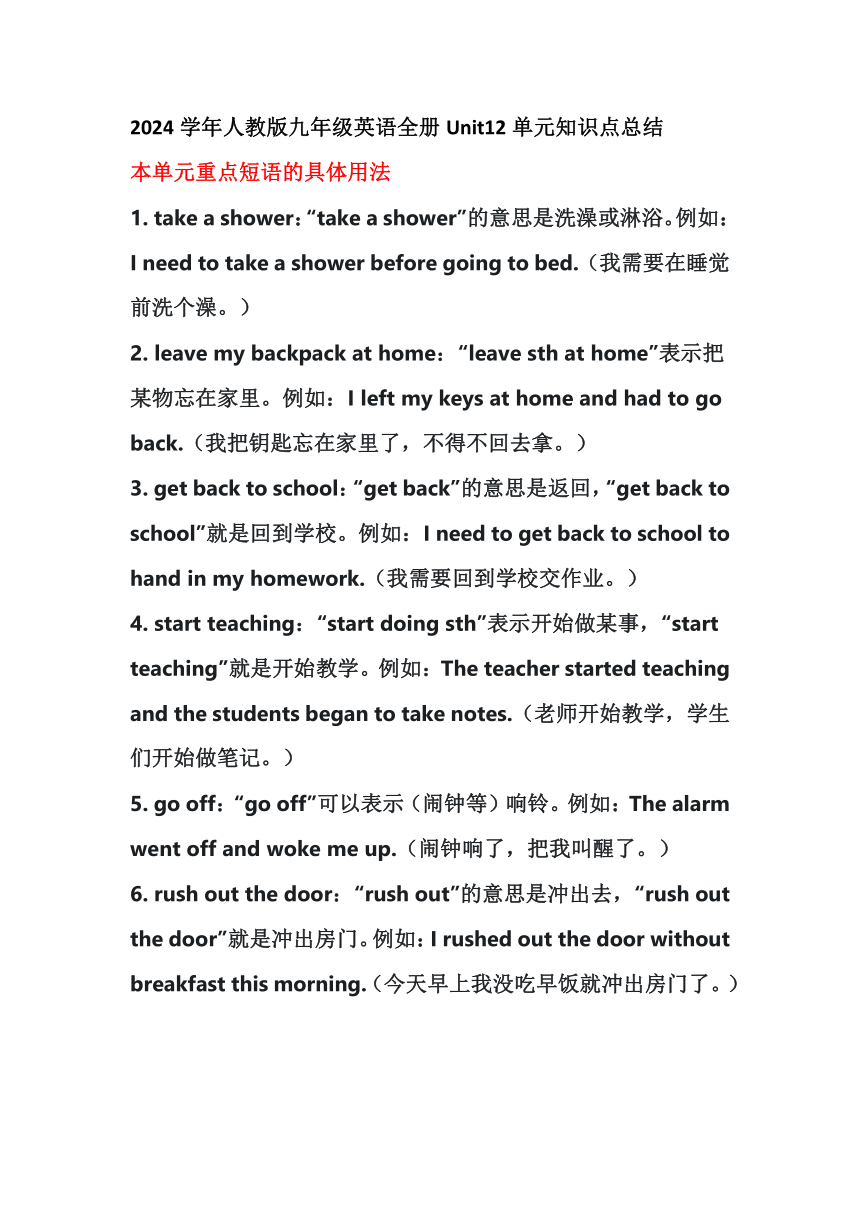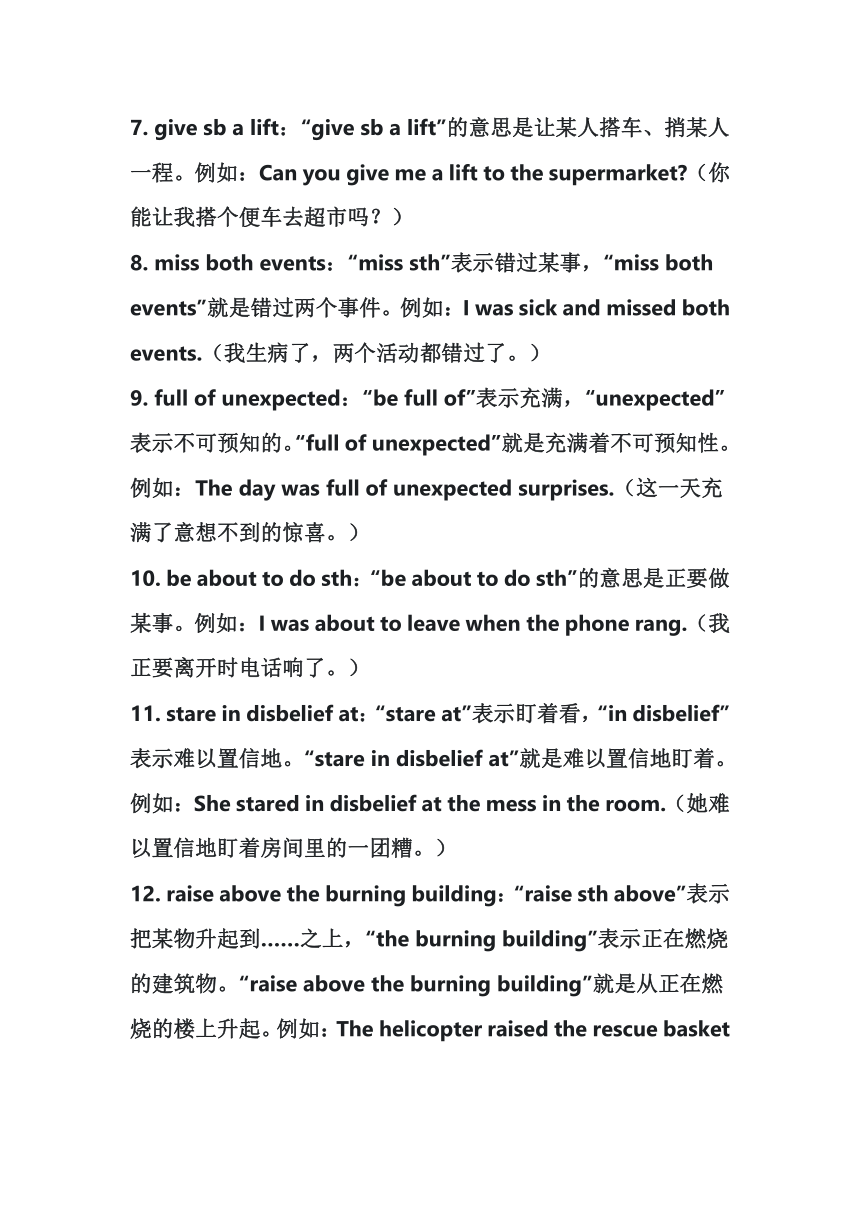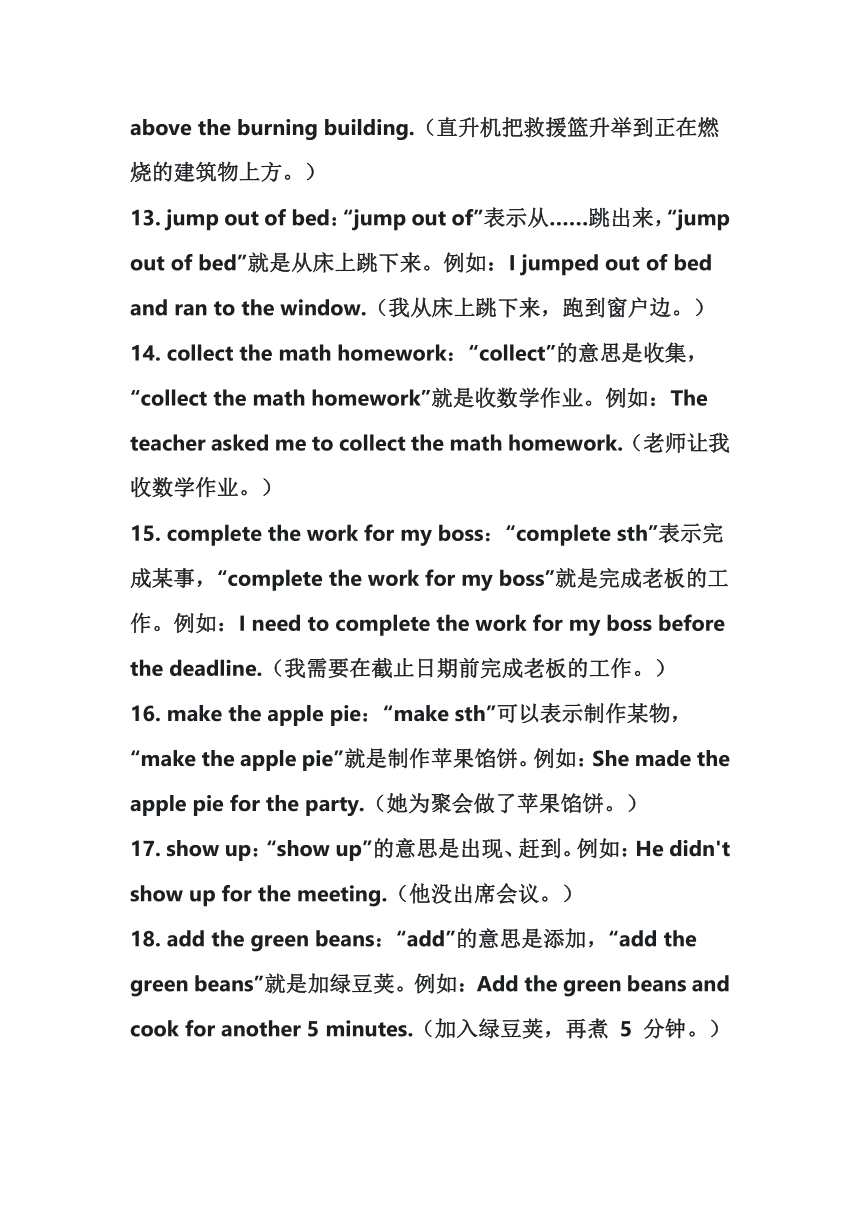Unit 12 Life is full of the unexpected 单元知识点总结
文档属性
| 名称 | Unit 12 Life is full of the unexpected 单元知识点总结 |

|
|
| 格式 | docx | ||
| 文件大小 | 17.5KB | ||
| 资源类型 | 教案 | ||
| 版本资源 | 人教新目标(Go for it)版 | ||
| 科目 | 英语 | ||
| 更新时间 | 2024-02-25 00:00:00 | ||
图片预览



文档简介
2024学年人教版九年级英语全册Unit12单元知识点总结
本单元重点短语的具体用法
1. take a shower:“take a shower”的意思是洗澡或淋浴。例如:I need to take a shower before going to bed.(我需要在睡觉前洗个澡。)
2. leave my backpack at home:“leave sth at home”表示把某物忘在家里。例如:I left my keys at home and had to go back.(我把钥匙忘在家里了,不得不回去拿。)
3. get back to school:“get back”的意思是返回,“get back to school”就是回到学校。例如:I need to get back to school to hand in my homework.(我需要回到学校交作业。)
4. start teaching:“start doing sth”表示开始做某事,“start teaching”就是开始教学。例如:The teacher started teaching and the students began to take notes.(老师开始教学,学生们开始做笔记。)
5. go off:“go off”可以表示(闹钟等)响铃。例如:The alarm went off and woke me up.(闹钟响了,把我叫醒了。)
6. rush out the door:“rush out”的意思是冲出去,“rush out the door”就是冲出房门。例如:I rushed out the door without breakfast this morning.(今天早上我没吃早饭就冲出房门了。)
7. give sb a lift:“give sb a lift”的意思是让某人搭车、捎某人一程。例如:Can you give me a lift to the supermarket (你能让我搭个便车去超市吗?)
8. miss both events:“miss sth”表示错过某事,“miss both events”就是错过两个事件。例如:I was sick and missed both events.(我生病了,两个活动都错过了。)
9. full of unexpected:“be full of”表示充满,“unexpected”表示不可预知的。“full of unexpected”就是充满着不可预知性。例如:The day was full of unexpected surprises.(这一天充满了意想不到的惊喜。)
10. be about to do sth:“be about to do sth”的意思是正要做某事。例如:I was about to leave when the phone rang.(我正要离开时电话响了。)
11. stare in disbelief at:“stare at”表示盯着看,“in disbelief”表示难以置信地。“stare in disbelief at”就是难以置信地盯着。例如:She stared in disbelief at the mess in the room.(她难以置信地盯着房间里的一团糟。)
12. raise above the burning building:“raise sth above”表示把某物升起到……之上,“the burning building”表示正在燃烧的建筑物。“raise above the burning building”就是从正在燃烧的楼上升起。例如:The helicopter raised the rescue basket above the burning building.(直升机把救援篮升举到正在燃烧的建筑物上方。)
13. jump out of bed:“jump out of”表示从……跳出来,“jump out of bed”就是从床上跳下来。例如:I jumped out of bed and ran to the window.(我从床上跳下来,跑到窗户边。)
14. collect the math homework:“collect”的意思是收集,“collect the math homework”就是收数学作业。例如:The teacher asked me to collect the math homework.(老师让我收数学作业。)
plete the work for my boss:“complete sth”表示完成某事,“complete the work for my boss”就是完成老板的工作。例如:I need to complete the work for my boss before the deadline.(我需要在截止日期前完成老板的工作。)
16. make the apple pie:“make sth”可以表示制作某物,“make the apple pie”就是制作苹果馅饼。例如:She made the apple pie for the party.(她为聚会做了苹果馅饼。)
17. show up:“show up”的意思是出现、赶到。例如:He didn't show up for the meeting.(他没出席会议。)
18. add the green beans:“add”的意思是添加,“add the green beans”就是加绿豆荚。例如:Add the green beans and cook for another 5 minutes.(加入绿豆荚,再煮 5 分钟。)
本单元重点句子
1.By the time I got up, my brother had already gotten in the shower.
当我起床时,我哥哥已经进了浴室了。
2.By the time I got outside, the bus had already gone.
当我出来时,公汽已经走了。
3.When I got to school, I realized I had left my backpack at home.
当我到达学校时,我才意识到我把背包忘在家里了。
4.By the time I walked into class, the teacher had started teaching already.
当我走进教室时,老师已经开始讲课了。
5.By the time I arrived at the party, everyone else had already showed up.
当我到达晚会时, 其他的每个人都已经到了。
6.When he put the noodles into the bowl, he realized he had forgotten to add the green beans.
当他把面条放进碗里时,他意识到他忘了添加绿豆荚了。
7.Before she got a chance to say goodbye, he had gone into the building.
在她得到一个向他告别的机会之前,他已经进入楼房了。
本单元重点知识点讲解
1. By the time:这个短语用作连词引导时间状语从句。当从句使用一般过去时,主句使用过去完成时;当从句使用一般现在时,主句使用一般将来时或将来完成时。例如:
- By the time he was ten, Tom had built a chemistry lab himself. 等到汤姆十岁的时候,他已经自己建了一个化学实验室。
- I’ll be in bed by the time you get home. 等你到家时,我已经上床睡觉了。
2. leave sth + 地点:这个词组表示“把某物忘在某处”。例如:
- I've left my umbrella at home. 我把伞忘在家里了。
- I left my book on the desk. 我把书忘在桌子上了。
- 注意,forget 意为“遗忘某物”,不能有具体的地点。例如:I forgot my umbrella yesterday. 我昨天忘了带伞。
3. invite:invite sb. to a place(或活动、聚会)意为“邀请某人到某一地方或参加某一活动”;invite sb. to do sth. 意为“邀请某人做某事”。例如:
- I think we have many friends now, and we must invite them to our place. 我想我们现在有很多朋友了,我们应该邀请他们来我们家。
- Kitty’s teacher Mr Wu invited me to join their school trip to the World Park. 基蒂的老师吴老师邀请我参加他们去世界公园的学校郊游活动。
4. so…that…:这个短语引导结果状语从句,so 后面加一个形容词或副词,意思是“如此……以至于……”。例如:
- This book is so interesting that everyone in our class wants to read it. 这本书如此有趣,以至于我们班的每个人都想看。(so+形容词)
- He ran so fast that I couldn't catch up with him. 他跑得太快了,我跟不上他。(so+副词)
作文训练
典型例题
假如你是Tom, 请记述你昨天不同寻常的一天:
1. 闹钟没响,所以起床晚了;
2. 想洗澡时,爸爸已经在洗澡了;
3. 没吃早餐去赶公交,可到达公交站时车已经走了,只好跑到学校去;
4.到达学校时,老师已经开始上课,对你的迟到感到很生气;
5.交作业时发现作业放在家里了;
6.历史课上受到老师的表扬,因为在家做了大量的准备工作。
优秀范文
Yesterday was a really bad day for me. To start with, my alarm clock didn’t go off so that I got up late. By the time I got up, my father had already gotten into the shower. Then I rushed to the bus stop without breakfast. By the time I got there, the bus had already left and I had to rushed to school. When I got to school, my teacher had already started teaching and he was really angry with me. Then it was time to hand in homework, but I had left it at home. I was really embarrassed at that time.One good thing was that my history teacher said something good to me because I had done a lot to prepare for this class. It was the only good thing for me yesterday.
本单元重点短语的具体用法
1. take a shower:“take a shower”的意思是洗澡或淋浴。例如:I need to take a shower before going to bed.(我需要在睡觉前洗个澡。)
2. leave my backpack at home:“leave sth at home”表示把某物忘在家里。例如:I left my keys at home and had to go back.(我把钥匙忘在家里了,不得不回去拿。)
3. get back to school:“get back”的意思是返回,“get back to school”就是回到学校。例如:I need to get back to school to hand in my homework.(我需要回到学校交作业。)
4. start teaching:“start doing sth”表示开始做某事,“start teaching”就是开始教学。例如:The teacher started teaching and the students began to take notes.(老师开始教学,学生们开始做笔记。)
5. go off:“go off”可以表示(闹钟等)响铃。例如:The alarm went off and woke me up.(闹钟响了,把我叫醒了。)
6. rush out the door:“rush out”的意思是冲出去,“rush out the door”就是冲出房门。例如:I rushed out the door without breakfast this morning.(今天早上我没吃早饭就冲出房门了。)
7. give sb a lift:“give sb a lift”的意思是让某人搭车、捎某人一程。例如:Can you give me a lift to the supermarket (你能让我搭个便车去超市吗?)
8. miss both events:“miss sth”表示错过某事,“miss both events”就是错过两个事件。例如:I was sick and missed both events.(我生病了,两个活动都错过了。)
9. full of unexpected:“be full of”表示充满,“unexpected”表示不可预知的。“full of unexpected”就是充满着不可预知性。例如:The day was full of unexpected surprises.(这一天充满了意想不到的惊喜。)
10. be about to do sth:“be about to do sth”的意思是正要做某事。例如:I was about to leave when the phone rang.(我正要离开时电话响了。)
11. stare in disbelief at:“stare at”表示盯着看,“in disbelief”表示难以置信地。“stare in disbelief at”就是难以置信地盯着。例如:She stared in disbelief at the mess in the room.(她难以置信地盯着房间里的一团糟。)
12. raise above the burning building:“raise sth above”表示把某物升起到……之上,“the burning building”表示正在燃烧的建筑物。“raise above the burning building”就是从正在燃烧的楼上升起。例如:The helicopter raised the rescue basket above the burning building.(直升机把救援篮升举到正在燃烧的建筑物上方。)
13. jump out of bed:“jump out of”表示从……跳出来,“jump out of bed”就是从床上跳下来。例如:I jumped out of bed and ran to the window.(我从床上跳下来,跑到窗户边。)
14. collect the math homework:“collect”的意思是收集,“collect the math homework”就是收数学作业。例如:The teacher asked me to collect the math homework.(老师让我收数学作业。)
plete the work for my boss:“complete sth”表示完成某事,“complete the work for my boss”就是完成老板的工作。例如:I need to complete the work for my boss before the deadline.(我需要在截止日期前完成老板的工作。)
16. make the apple pie:“make sth”可以表示制作某物,“make the apple pie”就是制作苹果馅饼。例如:She made the apple pie for the party.(她为聚会做了苹果馅饼。)
17. show up:“show up”的意思是出现、赶到。例如:He didn't show up for the meeting.(他没出席会议。)
18. add the green beans:“add”的意思是添加,“add the green beans”就是加绿豆荚。例如:Add the green beans and cook for another 5 minutes.(加入绿豆荚,再煮 5 分钟。)
本单元重点句子
1.By the time I got up, my brother had already gotten in the shower.
当我起床时,我哥哥已经进了浴室了。
2.By the time I got outside, the bus had already gone.
当我出来时,公汽已经走了。
3.When I got to school, I realized I had left my backpack at home.
当我到达学校时,我才意识到我把背包忘在家里了。
4.By the time I walked into class, the teacher had started teaching already.
当我走进教室时,老师已经开始讲课了。
5.By the time I arrived at the party, everyone else had already showed up.
当我到达晚会时, 其他的每个人都已经到了。
6.When he put the noodles into the bowl, he realized he had forgotten to add the green beans.
当他把面条放进碗里时,他意识到他忘了添加绿豆荚了。
7.Before she got a chance to say goodbye, he had gone into the building.
在她得到一个向他告别的机会之前,他已经进入楼房了。
本单元重点知识点讲解
1. By the time:这个短语用作连词引导时间状语从句。当从句使用一般过去时,主句使用过去完成时;当从句使用一般现在时,主句使用一般将来时或将来完成时。例如:
- By the time he was ten, Tom had built a chemistry lab himself. 等到汤姆十岁的时候,他已经自己建了一个化学实验室。
- I’ll be in bed by the time you get home. 等你到家时,我已经上床睡觉了。
2. leave sth + 地点:这个词组表示“把某物忘在某处”。例如:
- I've left my umbrella at home. 我把伞忘在家里了。
- I left my book on the desk. 我把书忘在桌子上了。
- 注意,forget 意为“遗忘某物”,不能有具体的地点。例如:I forgot my umbrella yesterday. 我昨天忘了带伞。
3. invite:invite sb. to a place(或活动、聚会)意为“邀请某人到某一地方或参加某一活动”;invite sb. to do sth. 意为“邀请某人做某事”。例如:
- I think we have many friends now, and we must invite them to our place. 我想我们现在有很多朋友了,我们应该邀请他们来我们家。
- Kitty’s teacher Mr Wu invited me to join their school trip to the World Park. 基蒂的老师吴老师邀请我参加他们去世界公园的学校郊游活动。
4. so…that…:这个短语引导结果状语从句,so 后面加一个形容词或副词,意思是“如此……以至于……”。例如:
- This book is so interesting that everyone in our class wants to read it. 这本书如此有趣,以至于我们班的每个人都想看。(so+形容词)
- He ran so fast that I couldn't catch up with him. 他跑得太快了,我跟不上他。(so+副词)
作文训练
典型例题
假如你是Tom, 请记述你昨天不同寻常的一天:
1. 闹钟没响,所以起床晚了;
2. 想洗澡时,爸爸已经在洗澡了;
3. 没吃早餐去赶公交,可到达公交站时车已经走了,只好跑到学校去;
4.到达学校时,老师已经开始上课,对你的迟到感到很生气;
5.交作业时发现作业放在家里了;
6.历史课上受到老师的表扬,因为在家做了大量的准备工作。
优秀范文
Yesterday was a really bad day for me. To start with, my alarm clock didn’t go off so that I got up late. By the time I got up, my father had already gotten into the shower. Then I rushed to the bus stop without breakfast. By the time I got there, the bus had already left and I had to rushed to school. When I got to school, my teacher had already started teaching and he was really angry with me. Then it was time to hand in homework, but I had left it at home. I was really embarrassed at that time.One good thing was that my history teacher said something good to me because I had done a lot to prepare for this class. It was the only good thing for me yesterday.
同课章节目录
- Unit 1 How can we become good learners.
- Section A
- Section B
- Unit 2 I think that mooncakes are delicious!
- Section A
- Section B
- Unit 3 Could you please tell me where the restroom
- Section A
- Section B
- Unit 4 I used to be afraid of the dark.
- Section A
- Section B
- Unit 5 What are the shirts made of?
- Section A
- Section B
- Review of Units 1-5
- Unit 6 When was it invented?
- Section A
- Section B
- Unit 7 Teenagers should be allowed to choose their
- Section A
- Section B
- Unit 8 It must belong to Carla.
- Section A
- Section B
- Unit 9 I like music that I can dance to.
- Section A
- Section B
- Unit 10 You're supposed to shake hands.
- Section A
- Section B
- Review of Units 6-10
- Unit 11 Sad movies make me cry.
- Section A
- Section B
- Unit 12 Life is full of the unexpected
- Section A
- Section B
- Unit 13 We're trying to save the earth!
- Section A
- Section B
- Unit 14 I remember meeting all of you in Grade 7.
- Section A
- Section B
- Review of Units 11-14
